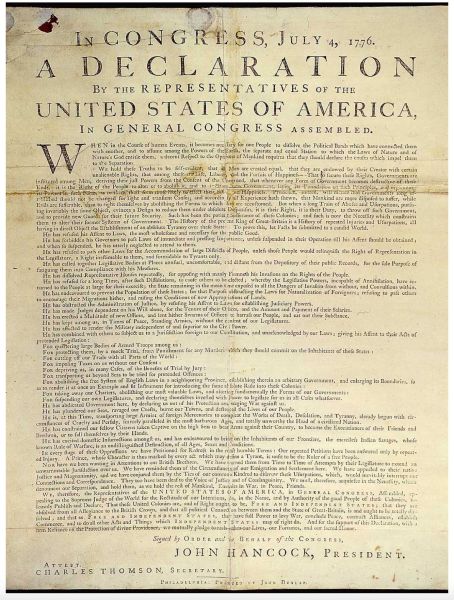The Course of Human Events
The Course of Human Events
National Public Radio used to do its listeners a signal favor on 4th July. During the afternoon news program "All Things Considered," the staff would read aloud the Declaration of Independence, from beginning to end. It unsettled me to listen to it. Although the Declaration stands as one of the nation's defining documents, I realized I knew little about it--only that Thomas Jefferson wrote it, and the Founding Fathers co-signed it on July 4th.
So I stopped whatever I was doing and sat down to listen to the staff reading it. At the end of the reading, I was shaking. It bothered me to hear Jefferson's determination to start a revolution. I remember the 1960s, after all, as a sort of revolutionary watershed, when all sorts of hair-brained people talked about starting a revolution. Social-studies teachers assured me, "Jefferson was then. This is now." Our Revolution and War occurred 200 years ago. We're at peace; so, no more need for talk about a revolution; but for some time now, I have had second thoughts about that presumption. Now, I believe that every American needs to dust off the Declaration of Independence and study it again.
Most Americans probably do not realize that the Declaration reads like an indictment. Jefferson discusses all the abuses of power committed against the American colonies by the British sovereign, King George III, and concludes that the colonies need to separate themselves from their erstwhile rulers 5000 miles away in Great Britain, and create their own nation!
Jefferson states stupendously that "Governments are instituted among men, deriving their just powers from the consent of the governed;" but whenever "government becomes destructive of these ends, it is the Right of the People to alter or to abolish it and institute a new government, laying its foundations on such principles and organizing its powers in such form" as seems "most likely to effect their Safety and Happiness."
The words sort of release me. They provide Americans with a way out of the predicaments of the dis-United States--the intramural squabbling and paranoia, the threat of civil war, the hampered sense of direction, and inconsistent policy-making; but unlike Jefferson, we don't indict the Republicans, the Democrats, or their leaders. We indict only the disunity, the growing paranoia, waning resolve, and the demoralization of the American citizenry.
I have decided that America has reached a point that Jefferson addresses in the very first lines of his Declaration: "When, in the Course of human events, it becomes necessary for one people to dissolve the bands which have connected them with another, and to assume among the powers of the earth the separate and equal station to which the Laws of Nature and Nature's God entitle them."
Jefferson focuses so hard on British injustice that he never bothers to mention something immediately apparent to Americans, that they should not forget. When we decide on a division of the country, we bet the ranch. We do that so that future Americans do not need to live with the daily intrusions and intimidation that we have come to accept as our lot for having the best nation in the world. We should not feel that our status in the world rightfully earns us our daily ration of resentment and browbeating.


